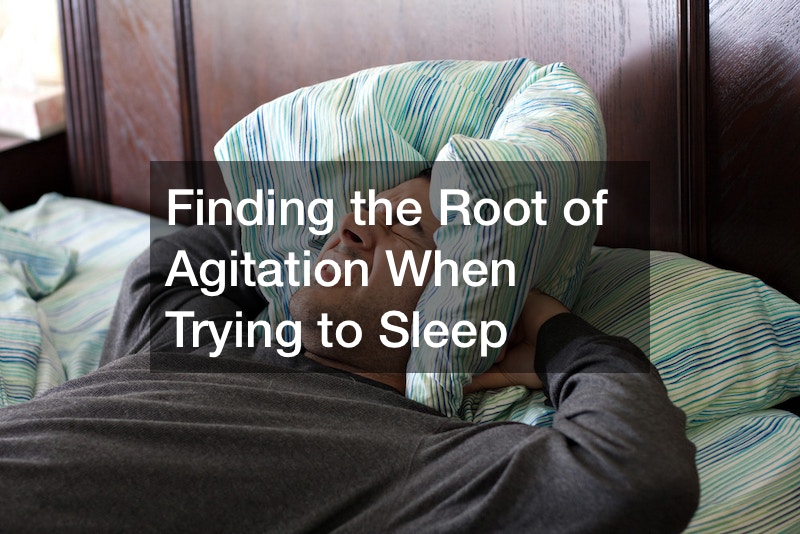

Sleep is vital to your body’s overall function, which is why experiencing agitation when falling asleep is a serious issue. There are various reasons why you may experience agitation when trying to sleep. One common reason could be anxiety, which can lead to its own host of other problems. You can do several things to ease your anxiety and promote relaxation when sleeping, including practicing mindfulness meditation. Additionally, getting enough rest will help calm the mind and promote sound sleep.
There are several potential causes of agitation when trying to sleep, but the most prevalent reason for this problem is stress. When you experience too much pressure, your body becomes overwhelmed and begins releasing cortisol and adrenaline to try and calm down. It can cause your feelings and thoughts to race through your head, which can in turn cause you to experience a restless state. Additionally, when you try to relax during your sleep, you can do so by focusing on your breath, which can assist in clearing your mind and promote relaxation. Here are some common reasons why you may experience agitation when trying to sleep.
Too Much Noise or Light
Too much noise or light is one of the main reasons why people have difficulty sleeping. When trying to sleep, your body releases a hormone known as melatonin which is responsible for making you feel sleepy. However, light and noise can disrupt this process and prevent you from falling asleep. It’s because your brain thinks it’s still daytime or time to be active, which can cause you to wake up at night.
You can do several things to reduce the amount of noise and light in your bedroom. First, you can invest in some blackout blinds or interior window shades to block out the light. Second, you can use a white noise machine to help block out outside noise. Finally, you can avoid using electronic devices in your bedroom, as the light from these devices can also disrupt your sleep. By taking these steps, you can create a more facilitative environment for rest and reduce the chances of waking up at night.
Physical Stress

Physical stress is a common cause of agitation when trying to sleep. When you’re physically stressed, your body gets into a state of fight or flight, with increased cortisol levels, blood pressure, and heart rate. This state assists you in dealing with immediate threats, but it’s not conducive to relaxation and sleep. Besides the physical effects of stress, you can also experience emotional and mental stress, which can cause difficulty sleeping. Pressure can come from various sources, including health, finances, relationships, and work concerns. It can be challenging to manage all your stressors, but it’s vital to attempt to do so to protect your sleep. There are various ways to reduce stress, and it’s crucial to find what’s ideal for you. Some standard stress-reduction techniques include journaling, investing in meditation, relaxation therapies, and exercise.
Acute Jaw Pain
Acute jaw pain is another prevalent reason for agitation when trying to sleep. It can occur due to several factors, including clenching, connective tissue disorders, and teeth grinding. Jaw pain can also signify other underlying medical conditions, such as ear infections, sinus infections, and migraines. Treatment for acute jaw pain usually includes jaw exercises, ice packs, and over-the-counter pain medication. Sometimes, a mouth guard is also good for preventing teeth grinding. If the pain remains persistent or becomes severe, it’s good to consult a dentist or doctor to check if you could have underlying health issues.
You may experience acute jaw pain for various reasons, but the most prevalent cause is that the pain makes you unconsciously clench your jaw. It can lead to a vicious cycle of agitation and pain, making it hard to get a good night’s sleep. You can do several things to ease acute jaw pain and get better sleep. First, you should try relaxing your jaw muscles by using a warm compress or massaging your jaw or neck. If the pain persists, you may need to seek advice from a dentist or doctor to get dental services. However, in most cases, adhering to these simple tips can get you the comfort you need.
Chronic Pain
Chronic pain often occurs because of nerve or joint disorders like endometriosis, migraines, fibromyalgia, and arthritis. Chronic pain can be extremely debilitating, making it hard to accomplish daily activities. The pain can also be severe and constant, making it difficult to get a good night’s sleep. When you don’t treat chronic pain, it can cause further sleeplessness and agitation. If you’re suffering from chronic pain, it’s crucial to seek medical treatment as soon as possible. Several effective arthritis treatments, such as medication and physical therapy, can assist you in relieving bodily pain and improving your life’s quality.
You can do several things to ease chronic pain and get better sleep. First, it’s vital to find a pain management plan that’s ideal for you. It may entail physical therapy, medication, med spas, or other treatments. Establishing prolific sleep habits, such as avoiding electronics and caffeine before bed and creating a relaxing bedtime routine, is also crucial. If chronic pain is interfering with your sleep, consult your doctor about how you can manage it.
Interpersonal Stressors

Interpersonal stressors are one of the roots of agitation when trying to sleep. When trying to sleep, your mind is typically in a state of rest. However, it can be challenging to fall asleep if you constantly contemplate the stressors in your life. The stressors can be anything from personal relationships to work-related problems. The key to falling asleep is finding ways to clear and relax your mind before bed. Several relaxation techniques can help, including deep breathing, meditation, and muscle relaxation. If you are still struggling to fall asleep, it may be worth talking to a doctor, therapist, or mediation services about your stressors and how to deal with them.
When you’re stressed, your body goes into fight-or-flight mode, which makes it hard to relax and fall asleep. It’s because stress triggers the sympathetic nervous system, which is responsible for your body’s stress response. The sympathetic nervous system releases hormones like cortisol and adrenaline, which increase blood pressure and heart rate. It makes it difficult for you to fall asleep because your body remains highly alert. Interpersonal stressors can include financial, relationship, and work stress. If you’re having difficulty sleeping, it’s crucial to identify any stressors in your life and find ways to manage them. It may entail creating a budget to ease financial stress, communicating with your partner about your relationship, and scheduling an appointment with family counseling services. After identifying and addressing your stressors, you can sleep more soundly.
Medically Disordered Sleep
Medically disordered sleep is the blanket term used to describe consistent difficulty falling or staying asleep due to a physical or mental health condition. Some instances of conditions that cause medically disordered sleep include sleep apnea, narcolepsy, insomnia, and restless leg syndrome. If you have a medical condition causing difficulty sleeping, you must consult your doctor about treatment options for sleep disorders. Sometimes, your doctor can prescribe medications to assist you in getting the sleep you need. In other instances, you may need to make lifestyle changes to treat medically disordered sleep. If you have sleep apnea, your doctor may recommend you use a CPAP machine for your sleep apnea treatment. Whatever the cause of your medically disordered sleep, it’s crucial to seek treatment to get the sleep your body needs.
Uninvited Guests in the Walls
There are fewer things more frustrating when trying to sleep than hearing pests in the walls. These pests can cause agitation, making you stay up at night and preventing you from getting the rest you need. The good news is that there are several things you can do to get rid of these unwanted visitors. One of the most effective ways to eliminate unwanted guests in the walls is to contact an indoor or outdoor pest control service. A professional can pinpoint the type of pest you’re dealing with and devise pest maintenance treatments. It’s often the easiest and most effective way to get rid of pests, but it can also be costly. If you’re looking for an affordable option, there are several do-it-yourself options you can try out. These include things like using natural repellents and setting traps. Whichever method you opt for, it’s vital to be persistent and patient. Getting rid of pests can be difficult, but it’s worth it for the peace of mind you’ll get from a good night’s sleep.
Imbalanced Diet

An imbalanced diet is another significant reason for agitation when trying to sleep. When you don’t take care of what you eat during the day, it will affect your sleep patterns during the night. The most prevalent type of imbalanced diet is consuming foods high in caffeine and sugar. These substances are responsible for stimulating your nervous system and making it challenging for you to fall asleep. Furthermore, an imbalanced diet can also cause nutrient deficiencies, leading to irritability and restlessness. If you’re having trouble falling asleep, it’s crucial to comprehend your diet and ensure you get the nutrients you need. You may also need to avoid caffeinated and sugary drinks and any other foods that make you feel agitated. By making simple changes to your diet, you can improve your sleep quality and get the rest your body needs.
Restless Leg Syndrome
Restless leg syndrome, or RLS, is a neurological disorder that affects your nervous system. It’s distinguished by a compelling urge to move your legs, often accompanied by itching, tingling, and crawling sensations. RLS can occur at any time, but it’s most prevalent at night, which makes it hard to fall asleep and stay asleep. In some instances, RLS can occur due to an underlying medical condition, such as diabetes or iron deficiency. In other instances, the exact cause can remain unknown. There’s no cure for RLS, but there are treatments that can assist in relieving symptoms. These include physical therapy, lifestyle changes, and medications. RLS is a chronic condition that can last for many years or even a lifetime. However, with proper treatment, patients with RLS can manage their symptoms and live normal lives.
Poor Sleep Schedule
It’s no secret that poor sleep habits lead to feelings of irritability and agitation. However, most people don’t realize that a poor sleep schedule is one of the root causes of agitation when trying to sleep. When you don’t follow a regular sleep schedule, your body gets out of sync, and it becomes challenging to fall asleep and stay asleep. It can lead to nights of tossing and turning, leaving you feeling cranky and exhausted the following day. If you’re struggling to get a good night’s sleep, one of the things you should do is establish a regular sleep schedule. Ensure you go to bed and wake up simultaneously every day, even during weekends. Avoid taking naps during the day, and create a relaxing bedtime routine to assist you in winding down before sleep. With some effort, you can get your sleep schedule back on track and start feeling more relaxed and rested when you sleep.
Oversleeping Before Bed

For many people, oversleeping before bed is one of the roots of agitation when trying to sleep. This is because when you oversleep, your body can’t prepare for sleep properly, leading to feeling restless and agitated. There are several things you can do to prevent this from occurring. First, avoid consuming alcohol and caffeine before bed, as these can make it challenging to fall asleep. Second, ensure adequate exercise during the day, as it can help you sleep better. Finally, establish a regular sleep schedule to familiarize your body with going to bed and waking up at the same time every day. By following these tips, you can ensure you fall asleep and stay asleep throughout the night.
You can do several things to sleep better, whether you’re trying to block out distractions or relax. Most people find that reading or listening to calm music before bed helps them fall asleep quickly. Others prefer a quiet environment, like sleeping on your back or in the dark. However, it’s crucial to experiment and find what sleeping method is ideal for getting the most out of your sleep.


